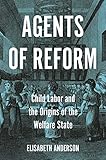Agents of Reform : Child Labor and the Origins of the Welfare State / Elisabeth Anderson.
Material type: TextSeries: Princeton Studies in Global and Comparative SociologyPublisher: Princeton, NJ : Princeton University Press, [2021]Copyright date: ©2021Description: 1 online resource (384 p.) : 22 b/w illus. 14 tablesContent type:
TextSeries: Princeton Studies in Global and Comparative SociologyPublisher: Princeton, NJ : Princeton University Press, [2021]Copyright date: ©2021Description: 1 online resource (384 p.) : 22 b/w illus. 14 tablesContent type: - 9780691220918
- Child labor -- Law and legislation -- History -- 19th century
- Welfare state -- History -- 19th century
- SOCIAL SCIENCE / Sociology / General
- Abeyance
- Adoption
- Advocacy group
- Altruism
- Ambiguity
- Bargaining power
- Bourgeoisie
- Bricolage
- Bureaucrat
- Capitalism
- Case study
- Child labour
- Collective bargaining
- Commodity
- Consideration
- Countermovement
- Cross-class alliance
- Economic liberalism
- Economic liberalization
- Economic power
- Economic security
- Effectiveness
- Employment
- Entrepreneurship
- Explanation
- Factory inspector
- Foreign policy
- Generosity
- Gesture
- Government agency
- Grassroots
- Implementation
- Income
- Incrementalism
- Industrialisation
- Industry
- Inspection
- Inspectorate
- Institution
- Jurisdiction
- Karl Polanyi
- Labor unrest
- Labour law
- Labour movement
- Labour supply
- Legislation
- Legislator
- Lobbying
- Market (economics)
- Market fundamentalism
- Motivation
- New institutionalism
- Obstacle
- Opportunity structures
- Pity
- Policy entrepreneur
- Policy
- Political capital
- Political science
- Politics
- Positioning (marketing)
- Positive feedback
- Precedent
- Primary source
- Reform movement
- Regulation
- Regulatory state
- Republic
- Requirement
- Scholarship
- Secondary source
- Self-interest
- Separation of powers
- Social Action
- Social Democratic Workers' Party (Netherlands)
- Social actions
- Social capital
- Social entrepreneurship
- Social environment
- Social group
- Social issue
- Social movement
- Social policy
- Social science
- Social structure
- Social transformation
- Sociology
- State actor
- State legislature (United States)
- Strategist
- The Three Worlds of Welfare Capitalism
- Theory
- Trade union
- United States Department of Labor
- Veto
- Voluntary association
- Voting
- Welfare state
- Welfare
- Working class
- 361.6509 23
- JC479 .A54 2021
- online - DeGruyter
| Item type | Current library | Call number | URL | Status | Notes | Barcode | |
|---|---|---|---|---|---|---|---|
 eBook
eBook
|
Biblioteca "Angelicum" Pont. Univ. S.Tommaso d'Aquino Nuvola online | online - DeGruyter (Browse shelf(Opens below)) | Online access | Not for loan (Accesso limitato) | Accesso per gli utenti autorizzati / Access for authorized users | (dgr)9780691220918 |
Frontmatter -- CONTENTS -- List of Illustrations -- List of Tables -- Acknowledgments -- 1 Introduction -- PART I -- Introduction to Part I -- 2 Securing the Social Order: The Politics of Child Labor Regulation in Prussia -- 3 A Tale of Two Reformers: Success in France, Failure in Belgium -- 4 Defending Democracy: Cultural Consensus and Child Labor Reform in Massachusetts -- Conclusion to Part I -- PART II -- Introduction to Part II -- 5 Restoring Solidarity and Domesticity: Conciliatory Factory Inspection in Imperial Germany -- 6 Appeasing Labor, Protecting Capital: Conciliatory Factory Inspection in Massachusetts -- 7 Social Justice Feminism and Labor Law Enforcement in Illinois -- Conclusion to Part II -- 8 Conclusion -- Notes -- Bibliography -- Index -- A NOTE ON THE TYPE
restricted access online access with authorization star
http://purl.org/coar/access_right/c_16ec
A groundbreaking account of how the welfare state began with early nineteenth-century child labor laws, and how middle-class and elite reformers made it happenThe beginnings of the modern welfare state are often traced to the late nineteenth-century labor movement and to policymakers’ efforts to appeal to working-class voters. But in Agents of Reform, Elisabeth Anderson shows that the regulatory welfare state began a half century earlier, in the 1830s, with the passage of the first child labor laws.Agents of Reform tells the story of how middle-class and elite reformers in Europe and the United States defined child labor as a threat to social order, and took the lead in bringing regulatory welfare into being. They built alliances to maneuver around powerful political blocks and instituted pathbreaking new employment protections. Later in the century, now with the help of organized labor, they created factory inspectorates to strengthen and routinize the state’s capacity to intervene in industrial working conditions.Agents of Reform compares seven in-depth case studies of key policy episodes in Germany, France, Belgium, Massachusetts, and Illinois. Foregrounding the agency of individual reformers, it challenges existing explanations of welfare state development and advances a new pragmatist field theory of institutional change. In doing so, it moves beyond standard narratives of interests and institutions toward an integrated understanding of how these interact with political actors’ ideas and coalition-building strategies.
Mode of access: Internet via World Wide Web.
In English.
Description based on online resource; title from PDF title page (publisher's Web site, viewed 01. Dez 2022)


